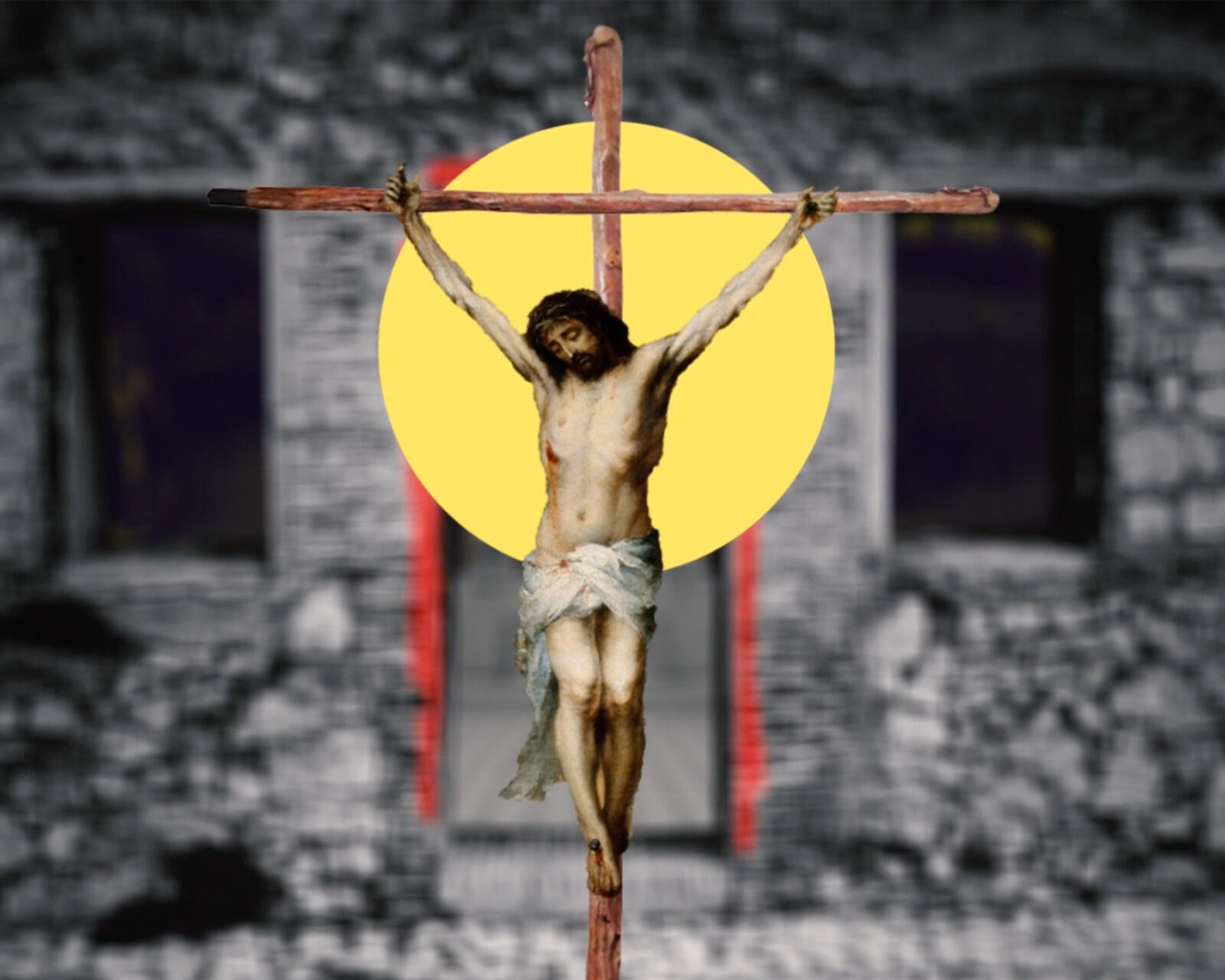Proclamation
What does ‘sacrifice’ really mean?

The Eucharist is sacrifice and communion/Connection
In this video, explore the power of Eucharistic Adoration. This practice of silence with God has the power to transform our lives.
Proclamation

Explanation

Podcast

Edmund: Thirty percent of the day that’s the average amount of time that the Statista Research Department says that people around the world spend every day on media.
We’ve created a world with 300 exabytes of information. That’s a big number and all that data helps us figure out which place to eat or what the smallest country in the world is or what the world record for the largest hamburger ever eaten is.
A 2019 survey found that on average, Americans check their phone 96 times per day.
That’s once every 10 minutes. But all this media and all this information, it’s a lot of noise, it’s a lot of stuff going on throughout your day.
Welcome. Very good to meet you. Nice to meet you, too. Thanks for not lighting this place on fire. Silence is good for us and so is stillness but silence and stillness isn’t good for us just because it’s quiet.
It’s good for us because Jesus said we should abide in him. He said abide in me and I in you just as a branch cannot bear fruit unless it’s attached to the vine. So we cannot bear fruit unless we abide in him.
So all this information and data is good but it can distract us from being still and silent in God’s presence. And it can separate us from him.
Jesus wants to give us his very presence and he does this in the Eucharist. The Eucharist is the body, blood, soul, and divinity of Jesus. It’s the source and summit of our faith and our relationship with Jesus.
But I want to tell you first about an ancient practice that you can do to help you get more out of Mass and your relationship with Jesus.
But first let’s talk about body parts.
As persons we can say there are three main areas of living and being a person: the hand, the head, and the heart. Now with our hand we act and serve and choose good or evil and keep busy.
And then there’s our head where we think and speak and engage in thoughts for good or evil.
And then there’s also our heart which the Catechism says is our inner dwelling. It’s a place of our emotions and passions but it’s also the center of our soul.
Keeping busy can be good, it’s not inherently evil but sometimes we use busyness and noise to keep our hand and our head and our heart busy and away from God.
And sometimes all that noise and busyness, it can just get exhausting to keep up with.
So in the liturgy we’re able to use our hand, head, and heart to worship God and to come into communion with him in the Eucharist.
But the Mass assumes that we have a relationship with Jesus already outside of Mass. Jesus often went off by himself to pray and sometimes even brought the disciples with him and we can do this as well.
One of the best ways that we can take a break from all the noise and give our hand, head, and heart a rest is an ancient practice called Eucharistic Adoration.
Eucharistic Adoration has a long history and tradition in the Church and it’s a way that we can put a pause button on Mass.
So there’s this part in Mass where the priest holds up the Eucharist and says, Behold the Lamb of God who takes away the sins of the world.”
And we look at Jesus in that moment in the Eucharist.
And so Adoration is a way for us to sit in that moment and to spend time with Jesus’ presence in the Eucharist and to look at him and abide with him in prayer.
Eucharistic Adoration is a great place for us to find that silence and stillness in God’s presence. And Adoration also helps increase our desire and hunger for Jesus in the Eucharist in Mass.
The Catechism in paragraph 2097 says this, “To adore God is to acknowledge, in respect and absolute submission, the nothingness of the creature who would not exist but for God. To adore God is to praise and exalt him and to humble oneself as Mary did in the Magnificat, confessing with gratitude that he has done great things and holy is his name. The worship of the one God sets man free from turning in on himself, from the slavery of sin and the idolatry of the world.
So Eucharistic Adoration allows us to sit in God’s presence and it keeps us from turning in on ourselves. We’re able to get away from the busyness of the world and in Adoration, we’re able to turn our hand, our head, and our heart to God and spend time with him.
So here’s some practical advice on Adoration if you want to incorporate this into your prayer life. So first many churches have times for Adoration or they might have an Adoration Chapel like this one here.
So if you can’t find an Adoration Chapel like this one here you can always go to your Church and be in the presence of the tabernacle where Jesus in the Eucharist is kept behind the altar.
So I would suggest starting with 20 minutes of Adoration, even shorter amount of time can be beneficial.
And when you first come to Adoration, just kind of sit down and place yourself in the presence of God and just kind of relax and let all those distractions that are in your head just kind of drift away.
So you want to spend some time just speaking to Jesus as you would a friend as if he was literally right there because he is.
And just speak to him as a friend until you feel like you’ve said enough and be sure to spend some time in silence, listening for him to speak back.
If your thoughts wander, that’s okay. Just gently bring your thoughts back to Jesus who’s present in the Eucharist.
If you want to bring something to help you focus your prayer time it’s great to bring a Bible, the Catechism or a journal to write in.
But I’d highly recommend spending at least half the amount of time that you spend in silence not reading anything not even necessarily talking to God.
But half of the time that you spend just silently listening for God’s voice and sitting and abiding in his presence. Eucharistic Adoration is a chance to abide with Jesus and experience his peace and presence in a way that will change your relationship with him and your experience of the Mass.
It welcomes Jesus into those places. It sets us free from turning in on ourselves. Adoration will also increase our hunger for the Eucharist.
If you invest in going to Adoration once a week, spending time with the real presence of Jesus, your experience of Mass will change. Jesus said abide in me.
Jesus wants to give us peace, he wants to give us rest from the world, and he wants us to come away with him and stay a while. And Eucharistic Adoration gives our hand, head, and heart a rest. Eucharistic Adoration is a chance to abide with Jesus and experience his peace and presence in a way that will change your relationship with him and your experience of the Mass.
Emily: Hi, my name is Emily.
Edmund: And my name is Edmund.
Thanks for watching that video.
Emily: We made this video because we believe the Catechism of the Catholic Church is not just a collection of ideas, a set of rules, or a textbook.
Edmund: Yeah, we believe that Catechism is a faithful echo of a God who desires to reveal himself to us.
Emily: Real + True makes videos and other content to re-transform this echo into a living voice for the modern world.
Edmund: And right now all of these videos are made available for free in multiple languages: English, French, Spanish, and Portuguese.
And right now we’re trying to go through the entire first pillar of the Catechism.
Emily: We hope to make even more videos to cover the entire Catechism and we want to do it in even more languages and continuing to make this resource available for free to everyone.
Edmund: Yeah so you can help us accomplish that by giving a one-time gift or a monthly donation.
Every little bit helps us accomplish this goal.
Emily: You can also show your support by sharing this video, subscribing to see more of our content, and I invite you to check out realtrue.org to learn all the ways you can support this mission.
Emily: Thank you.
Edmund: Thanks.
U.42 — CCC 2807-2815

What does it truly mean to live in the name of Jesus? Learn from the martyrs.
WatchU.41 — CCC 2759-2806

Let the words of the Lord’s Prayer fill your heart, mind, and soul as you grow closer to God as Our Father.
WatchU.40 — CCC 2697-2758

Learn from Jesus’ example of stepping away to pray, and explore how you can create your own “daily monastery” for prayer and reflection.
WatchU.39 — CCC 2650-2696

The Catechism reminds us that while we can’t control the Holy Spirit, we can prepare our hearts and minds for prayer by relying on the Church’s “wellsprings” of prayer.
WatchBy submitting this form you consent to receive emails about Real+True and other projects of OSV.